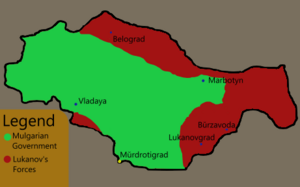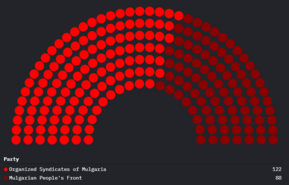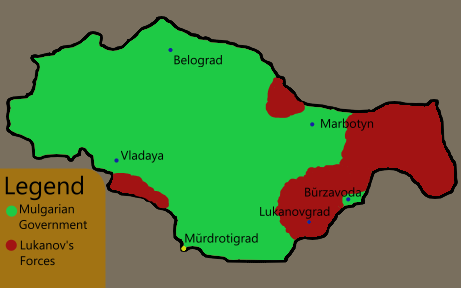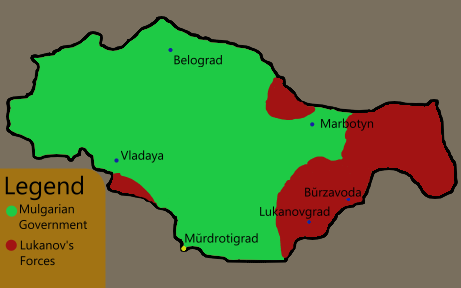Mulgarian Civil War: Difference between revisions
BecomeMonke (talk | contribs) |
BecomeMonke (talk | contribs) (More details on the siege of Bŭrzavoda) |
||
| (4 intermediate revisions by the same user not shown) | |||
| Line 5: | Line 5: | ||
| place = Mulgaria | | place = Mulgaria | ||
| date = Start date: 8th of April of 1927 | | date = Start date: 8th of April of 1927 | ||
| image = Mulgarian Civil war week | | image = Mulgarian Civil war week 2.png | ||
| caption = Military situation as of | | caption = Military situation as of October 1927 | ||
| status = Lukanov advancing; Bŭrzavoda taken by Lukanov | | status = Lukanov advancing; Bŭrzavoda taken by Lukanov | ||
| combatant1 = Mulgarian People's Republic | | combatant1 = Mulgarian People's Republic | ||
| Line 14: | Line 14: | ||
}} | }} | ||
The Mulgarian civil war (Also known as Lukanov's revolt) is an ongoing conflict in [[Mulgaria]]. In March of 1927 the party aparatus of the Mulgarian people's Front convened and agreed on expelling Georgi Lukanov from the party following recent controversies over Tapedon and his attempted ban of the Organized Syndicates of Mulgaria. This resulted in Lukanov losing chairmanship. In early april 1927 Georgi Lukanov declared Ivan Borisov's rule over Mulgaria illegitimate and began a military campaign in the Mulgarian countryside as to retake power. | The Mulgarian civil war (Also known as Lukanov's revolt) is an ongoing conflict in [[Mulgaria]]. In March of 1927 the party aparatus of the Mulgarian people's Front convened and agreed on expelling Georgi Lukanov from the party following recent controversies over Tapedon and his attempted ban of the Organized Syndicates of Mulgaria. This resulted in [[Georgi Lukanov]] losing chairmanship. In early april 1927 Georgi Lukanov declared Ivan Borisov's rule over Mulgaria illegitimate and began a military campaign in the Mulgarian countryside as to retake power. | ||
== Overview == | == Overview == | ||
| Line 61: | Line 61: | ||
==== April 1927 ==== | ==== April 1927 ==== | ||
[[ | Following [[Georgi Lukanov|Georgi Lukanov's]] expulsion from the party, he called upon loyalists to take up arms and join him in a campaign against the [[Mulgaria|People's Republic of Mulgaria]]. His supporters consisted of a large section of the military, and a large portion of the peasantry in the Eastern Mulgarian countryside. Many of Lukanov's supporters, particularly among the military, heeded his call and Lukanov spent most of the initial months of the war consolidating his army. | ||
[[File:Mulgarian_Civil_War_Map.png]] | |||
==== Siege of Bŭrzavoda ==== | |||
From the very start of the civil war, Lukanov's rebel forces surrounded the city of Bŭrzavoda. The general began to cut off supplies to the city in a multitude of ways in order to starve the Military presence remaining within it. Initially the Mulgarian government struggled to combat this blockade. However, on the latter end of June, The Mulgarian admiral, Dimitar Kanchov, attempted a retreat of the troops through the Bŭrzavoda Port. | |||
Georgi Lukanov had not expected the Mulgarian navy to mobilize so quickly and struggled to combat the naval escort that rescued many Mulgarian soldier encircled in Bŭrzavoda. Ultimately, the [[Georgi Lukanov|People's General]] manage to consolidate his navy and drive out the escort before all the soldier could be evacuated. Following the evacuation, few soldiers were left in Bŭrzavoda, ultimately leading to the fall of the city soon after. | |||
==== August 1927 ==== | |||
[[File:Mulgarian Civil war week 1.png]] | |||
==== | ==== Lukanov's Northern Campaign ==== | ||
Latest revision as of 17:05, 24 December 2024
The Mulgarian civil war (Also known as Lukanov's revolt) is an ongoing conflict in Mulgaria. In March of 1927 the party aparatus of the Mulgarian people's Front convened and agreed on expelling Georgi Lukanov from the party following recent controversies over Tapedon and his attempted ban of the Organized Syndicates of Mulgaria. This resulted in Georgi Lukanov losing chairmanship. In early april 1927 Georgi Lukanov declared Ivan Borisov's rule over Mulgaria illegitimate and began a military campaign in the Mulgarian countryside as to retake power.
Overview
Origin of the conflict
Following growing discontent over Lukanov's rule within the Mulgarian People's assembly as a result of his many controversies, The Mulgarian People's Front (MPF) held a meeting without Lukanov's presence in which they held a vote on wheter to expel Georgi Lukanov from the party, the motion was called by Lukanov's main intra-party rival Sonya Lyapcheva and passed with 61% of the party voting aye. According to the constitution of Mulgaria one must be part of a political party to hold office, therefore, following Lukanov's expulsion from the MPF it was deemed he could he could no longer hold the Chairmanship.
Following Lukanov's loss of the chairmanship, the general moved to the city of Lukanovgrad. There he met with several member of the Mulgarian Military's high command who remained loyal to him. In a speech to the people of Lukanovgrad, Lukanov declared Borisov, who had been recently elected chairman, a pretender claiming he had no right to overrule the people's will. Lukanov was also quoted to have said "A revolution is not simply the takeover of power by the people, a revolution is a continuos process of reaffirmation of the power of the people over the power of tyranny, Borisov, believes himself more powerful than the people, we must demonstrate that he is not!". Shortly after the speech, Lukanov began his campaign accross the countryside where he has been enganing government forces and attempting to gain as much ground as possible.
Political consequences
Following the procedure established by the Mulgarian constitution, The Mulgarian Government established elections for the Mulgarian People's Assembly in which a historic victory was achieved, for the first time since the coup of 1916 the OSM held a majority in the Assembly. Despite a slim majority, the Organized Syndicates of Mulgaria (OSM) managed to elect their party leader, Ivan Borisov, as Chairman of the People's Republic, being the first time since the Executive People's Council that a member of the OSM held the highest executive office.
Ivan Borisov's Election, however historic, was highly contested only winning 79 of the Assembly's 200 seats. A diverse cast of Assembly members were nominated, Sonya Lyapcheva, Lukanov's intra-party rival and ex-member of the executive People's Council was a close second with 57 votes. Eva Zafirova, from the Anarcho-Syndicalist branch of the OSM won 33 votes preaching cooperation between the OSM and MPF. She was closely followed by Georgi Lukanov's Brother, Tihomir, who won 31 votes.
Current situation
Following the recent capture of Bŭrzavoda by Georgi Lukanov, the General is amassing his forces, seemingly in preparation for a large-scale attack.
Background
Executive People's Council
The executive People's Council played a crucial role in cementing Mulgaria's Geopolitical situation and established political dynamics still relevant in modern Mulgarian Politics. Whilst Georgi Lukanov was a somewhat popular figure prior to his appointment as member of the Council, the overwhelming success of the body as perceived by the Mulgarian population, made of its 3 constituents universally known and highly popular figures. Whilst almost all members saw massive benefits in their political careers as a result of this body, Stefan Filov being the notable exception, Georgi Lukanov and Stefan Borisov both owed their leadership positions within their respective parties to their actions during this period.
Georgi Lukanov
Georgi Lukanov, despite his overwhelming popularity, quickly revealed himself to be an erratic and controversial leader on his own. Lukanov's controversies caused many within and without his party to reconsider his position as chairman. This ultimately led to the decision by the Mulgarian People's Front to expel Georgi Lukanov from the party after 7 years of chairmanship, which kickstarted the Mulgarian Civil War.
Areole Controversy
Refugee crisis
Ever since the Coup in 1916, the Mulgarian People's Republic has experience elevated numbers of emigration. Whilst the emigration is largely from the upper classes of Mulgaria who felt threatened by the Government's left-wing ideology, following Lukanov's more repressive measures (for example, the banning of Political parties, with the exception of the MPF and OSM) and his diplomatic approachment with the United Communard Republics, there was a significant increase in refugees fleeing Mulgarian for fear of political persecution. The refugee crisis harmed Mulgaria's relationship with its neighbors and reflected poorly on the supposed popular basis of the Mulgarian government.
Tapedon Controversy
On the 15th of june of 1926, the Nepublian army noticed increased military presence in the Mulgaria-Tapedon border. On the following day, Georgi Lukanov met with the president of the Republic of Faru, Ljuba Milenkovic. During this meeting, Georgi Lukanov called for Nepublia to recognize Mulgarian claims over Tapedon and threatened to escalate the situation further should these demands not be met. Ultimately, this meeting resulted in: the souring of Mulgaria's relationship with Faru, Faru pledging to stand by Nepublia should the situation escalate, and Lukanov's denouncement of Ljuba and the Mutualists, going as far as to call Milenkovic a liberal.
The chairman's aggressive posturing ultimately backfired as, in a major upset in Nepublian politics, the Sparrow Party lost their majority in government, with the Crow Party taking their place. The more militaristic Crow Party served as a stark contrast to the Sparrow Party whose pacifism was now perceived as meek by the threatened Nepublian population. Following Nepublia's Mobilization, the general chose to back down from the conflict, at first silently, then after months of silence on january of 1927, the Chairman officially rescinded his claims over Tapedon.
Some geopolitical experts argue that Lukanov's shameful retreat from the Tapedon border marked the downfall of his government, as he began to lose support from some of his most loyalist members of the Assembly.
Attempted ban of the OSM
Mulgarian People's Assembly
Timeline
April 1927
Following Georgi Lukanov's expulsion from the party, he called upon loyalists to take up arms and join him in a campaign against the People's Republic of Mulgaria. His supporters consisted of a large section of the military, and a large portion of the peasantry in the Eastern Mulgarian countryside. Many of Lukanov's supporters, particularly among the military, heeded his call and Lukanov spent most of the initial months of the war consolidating his army.
Siege of Bŭrzavoda
From the very start of the civil war, Lukanov's rebel forces surrounded the city of Bŭrzavoda. The general began to cut off supplies to the city in a multitude of ways in order to starve the Military presence remaining within it. Initially the Mulgarian government struggled to combat this blockade. However, on the latter end of June, The Mulgarian admiral, Dimitar Kanchov, attempted a retreat of the troops through the Bŭrzavoda Port.
Georgi Lukanov had not expected the Mulgarian navy to mobilize so quickly and struggled to combat the naval escort that rescued many Mulgarian soldier encircled in Bŭrzavoda. Ultimately, the People's General manage to consolidate his navy and drive out the escort before all the soldier could be evacuated. Following the evacuation, few soldiers were left in Bŭrzavoda, ultimately leading to the fall of the city soon after.





